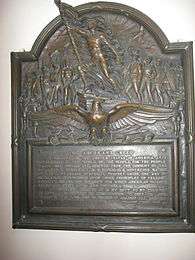American Creed
The American Creed is a statement of the defining element of American identity, first formulated by Thomas Jefferson and elaborated by many others,[1] that includes liberty, equality, individualism, populism, and laissez faire.[2]. Not to be confused with Dean Alfang's "An American's Creed".
The American's Creed (Resolution)

"The American's Creed" is the title of a resolution passed by the U.S. House of Representatives on April 3, 1918. It is a statement written in 1917 by William Tyler Page as an entry into a patriotic contest.
I believe in the United States of America, as a government of the people, by the people, for the people; whose just powers are derived from the consent of the governed; a democracy in a republic; a sovereign Nation of many sovereign States; a perfect union, one and inseparable; established upon those principles of freedom, equality, justice, and humanity for which American patriots sacrificed their lives and fortunes.
I therefore believe it is my duty to my country to love it, to support its Constitution, to obey its laws, to respect its flag, and to defend it against all enemies.— William Tyler Page, The American's Creed[3]
See also
References
- ↑ Huntington, Samuel (2004). Who are we?: The challenges to America's national identity. Simon & Schuster. p. xv. ISBN 0-684-87053-3.
- ↑ Lipset, Seymour (1992). "Affirmative Action and the American Creed". The Wilson Quarterly (1976-). Wilson Quarterly. 16 (1): 52–62.
- ↑ The American's Creed at USHistory.org
Further reading
- Murdock, Myrtle Cheney (1958), The American's Creed and William Tyler Page, Monumental Press. ISBN 978-1258318864
- Page, William Tyler (1921), The Book of the American's Creed, Sons of the American Revolution: The Country Life Press. OCLC 4783599